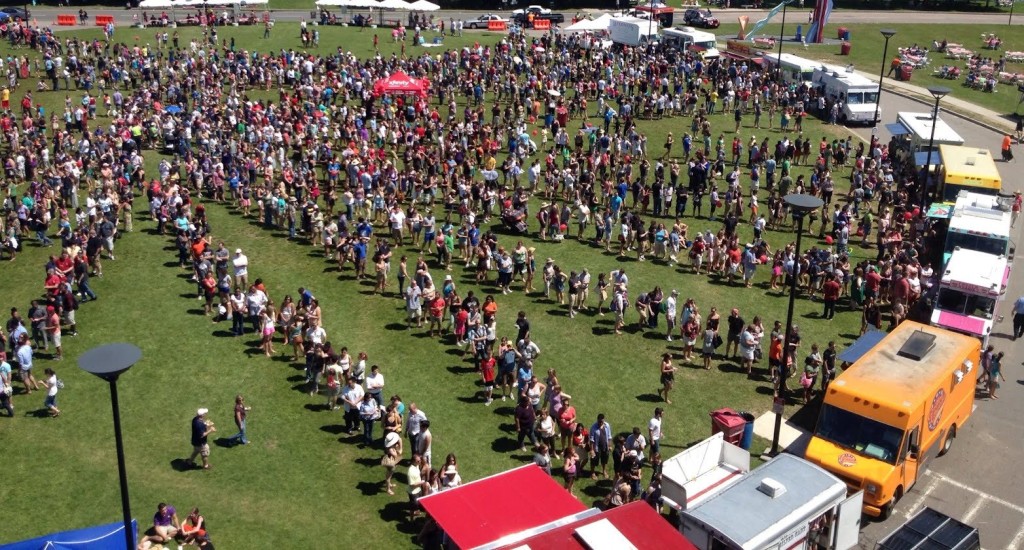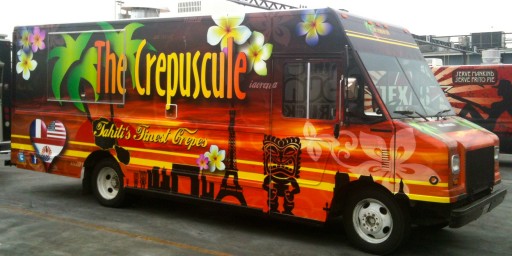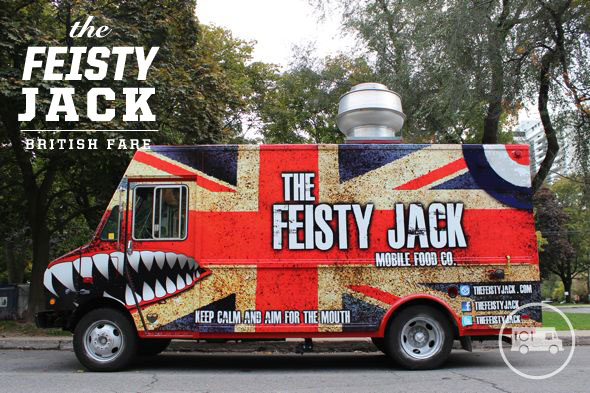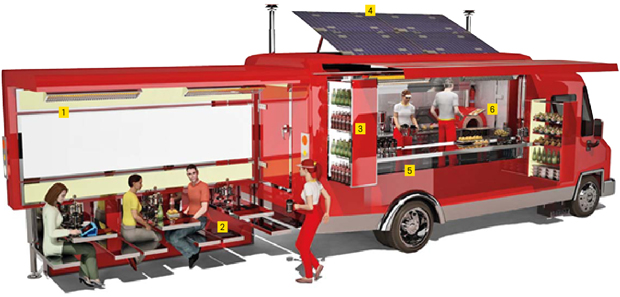 By Tara Hall
By Tara Hall
July 7, 2015
BURLINGTON, ON
Food trucks are more than just a phenomenon, they’re a social movement
What was once the domain of fried potatoes and tubular meat products has undergone a culinary revolution. Food trucks are more than just a phenomenon or fad. They represent a new social movement in the culinary world and deserve a place in the foodscape of a vibrant community.

That is a crowd and that is a circle of Food Trucks – the idea has taken hold – will Burlington ever see a set up like this?
The rise of the gourmet food truck movement began early this century with the economic downtown in the United States. There was a convergence of opportunities. A drop in housing and construction saw mobile food vehicles that had once served the construction sites go under.
Restaurants felt the pinch as the economy slowed and were laying off staff, and frugal consumers were looking for inexpensive meals. Unemployed chefs, cheap trucks and thrifty consumers made the gourmet food truck an opportunity to cash in on.
Less than a decade since, IBISWorld research estimates that there are more than 4,000 food trucks operating in the United States and they have out-performed the rest of the food industry. The movement came to Canada about five years ago.

Some of the Food trucks are almost an art form
Niagara’s el Gastronomo Vagabundo, started operation in 2010 and is widely regarded as the first gourmet food truck in Canada and certainly a pioneer in Ontario’s growing food truck movement. It is a movement that has already established a hold in Golden Horseshoe communities outside of Burlington and contributes to their status as culinary destinations for foodies.
In today’s consumer culture we buy the signs and ideas more so than the commodity itself. In the case of food we’re not buying sustenance, we’re buying, local, organic, vegan, exotic, fusion, gourmet, authentic, exclusive, trendy, ethical, artisanal sustenance.
This shift in the culinary world is not about food trucks. Rather, the foodie culture has been a growing movement and smart restauranteurs recognize the trends. There has been democratization of the food world at the consumer end where foodies seek authentic, exotic, ethical or gourmet food but a bricks and mortar restaurant, whether it’s hole-in-the-wall or haute cuisine, is where you’ve needed to go to get it.
Food trucks, however, represent a democratization at the production end. Food truckers have brought all the caché foodie consumers seek to a mobile space that comes to a street near you. The trucks come with gourmet food, bright colours, amusing names, and a buzz created by social media.
The trucks often pay homage to the cuisine, cooking techniques or food represented. There is a playful imitation of gourmet or comfort food but in a way that celebrates the original. Comfort food like grilled cheese is elevated with gourmet artisanal ingredients. A blurring of culinary genres is a common food truck theme as evidenced by Asian tacos with kimchi or a truck dedicated to noodles from all culinary traditions.

You know what you’re getting from this Food Truck
Foodies, seeking that authentic, exotic, ethical or gourmet food now have another place to get it. Restaurant associations, rather than welcoming the culinary newcomers have lobbied municipalities for restrictive by-laws that limit them. In some cities entire zones are off limits for food trucks and although another restaurant can open up next door a food truck can’t operate for the afternoon within a specified buffer zone. What the restaurant associations don’t realize is that if a foodie wants a food truck experience they will find a food truck. If they want a Michelin star experience they will find a Michelin star restaurant. That is a part of what the foodie culture is about.
As for food truckers, they’re a plucky lot. Food truck operators in Ontario formed an association of their own to lobby for better access to streets and parks. They founded locations in some communities with access for all food trucks, and participate in food truck rallies where they come together and operate as a collective attraction.
Their marketing techniques are primarily through social media and cross promote other trucks. Some are fine to stay on the road while others may look at the truck as a stepping stone to a bricks and mortar operation. Just down the road in food truck friendly Hamilton, at least three food trucks are opening restaurants in the community.

This is taking the idea of a Food Truck a little further than the very first vehicles – but if there is a market for this – who knows.
Although meeting with resistance from traditional restaurants, and municipal politics, the renegade restaurants on wheels are a growing success and a movement that’s here to stay.
Indeed they are – the design of the Beachway Park – that we won’t see for at least ten years includes Food Trucks that will cater to the thousands of people who will use that park.
About the author:
I am not in the food truck or any food service industry, nor do I have family or friends in the industry. I work in municipal government for the City of Hamilton. The research I based the op-ed on was conducted as part of my studies towards a Masters of Arts in Intercultural and International Communications through Royal Roads University in Victoria. It’s based on a project that I completed for a Public Culture course where I looked at the food truck movement in Southern Ontario from a postmodern perspective.
















I think that food trucks would be a wonderful addition to the new Windows to the Lake and Nelson Park. If any rezoning is required, I’m sure that Councillor Dennison can champion the change. ;-}
The Museums of Burlington are hosting a food truck rally with delicious gourmet offerings from: LUCHADOR – Mexican Fusion / International Cuisine; DOBRO JESTI – Slovenian / German-inspired Cuisine; NUDULZ – Italian Food; MANGO CHUTNEY – Indian Food; URBAN EXPRESS- North American & European-style Steakery; CAFE DU MONDE – French-Parisian & International Crepes; PAPPAS GREEK—Greek Food; TROPICAL TEMPTATIONS –Premium drinks & desserts and more.
This is part of the Joseph Brant Day Festival 2015, Pan Am/Parapan Am Games Celebration, which will be held on the Civic Holiday Monday, August 3rd at historic La Salle Park, Burlington. The Joseph Brant Day Festival is an official partner of the Toronto 2015 Pan Am/Parapan Am Games.
Terrific article.
Even though I am not a fan of street food I can see how this industry could rapidly grow. Generations of folks grew up on food vendors at festivals and fairs. In the grand CNE days my friends’ first stop was to the food building and outside vendors rather than exhibits fun rides. And then back again sever times over the weekend.
Bring these food truck vendors to community streets and nostalgic folks will flock there as well during work breaks, errand running, shopping, etc. In this modern society that seems to be always running late food trucks could out compete fast food restaurants with their interesting variety of fare.